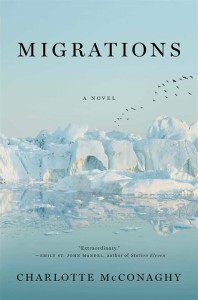
Arriving in Greenland with only her research gear, Franny Stone is determined to study the last of the Arctic terns. She says that even though her expedition has been canceled, she intends to follow the terns on what will be their final migration to Antarctica.
The book is set in the near future when climate change has wiped out most birds, fish, and animals. The scientific community believes the Arctic terns are extinct, but Franny does find the last few. However, without fish to eat along the way, the terns might not make it to Antarctica, so she must find a way to follow along with them. She must know if any of them make it safely.
Franny talks her way onto a fishing boat with a curmudgeonly captain and quirky crew. Unable to make a living off the meager fish in the sea and hounded by people onshore who are furious that the fishermen are killing the few remaining fish, the sailors are lured by Franny’s promise of a last big haul. So they set off, using her instruments to follow the terns she banded.
But Franny is more than a loner; she is a leaver. She says:
It isn’t fair to be the kind of creature who is able to love but unable to stay.
What and who she has left and why are unclear. Where is the husband she writes to every day? What crime has she committed? Will she find her mother? The tales of her losses begin to unspool in side currents, her dark secrets roiling the story by tossing the reader back and forth in time.
Most of the people in my book club were unsettled by these time shifts and confused by the fragments of several stories that only gradually begin to cohere. The fragmentation, confusion, and dissociation reflect Franny’s state. She, too, is ready to become extinct.
The themes of loss and leaving and migrations are multi-layered, but McConaghy treads lightly. It was only when I finally wrenched myself away from the book at the end that I was able to appreciate how intimately they permeated the story. I also appreciated that, while this future is only to likely to occur and pretty soon, the book is different form other dystopian novels, not frantic or furious. It is a quiet book.
And truly a magnificent one. The writing, the world-building, the offbeat characters, the way McConaghy inspired my immediate allegiance to this damaged woman and her quest: all excellent. My favorite part was when she was on the ship—I so enjoyed the crew members, their community of oddballs and their treatment of Franny.
Because of my outsized love for this story, my disappointment at the end was also outsized. As we drew closer, I wondered how the author would wrap it up. Since I had sometimes wondered if Franny was an unreliable narrator, I was even prepared for it to have all been a dream. However, the actual end seemed to have been written for a different book altogether, so at odds was it with the rest of the book. On this point, everyone in the book club agreed.
One person noted how odd it was that we kept saying we loved the book even as we discussed what bothered us. For example, many members struggled to read it, confused by the fragmented plots and the time shifts. Several said they could only read a little at a time, though I barreled through it, as did at least one other person. Yet we did love it.
We loved the tenderness of this story. We loved the crows who brought her presents and the sailors who gruffly tried to help her. We believed in her mission, we who have seen the chestnut trees disappear, the wild dogwoods, and now the beeches. We’ve tracked the ups and downs of the crabs, oysters and rockfish in the Chesapeake, and participated in bird species counts. In our long lives we’ve known leave-takings and losses.
Read this book. Be prepared to be moved. And moved to action, even if it is only to go outside to appreciate the bright zinnias and sunflowers, to hear the whir of hummingbirds at the feeder, to see the deer moving like ghosts among the trees.
What have you lost that you can never get back? What journeys are you compelled to take?